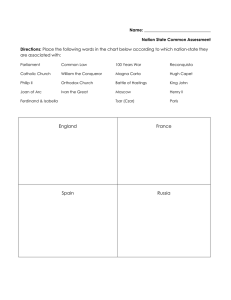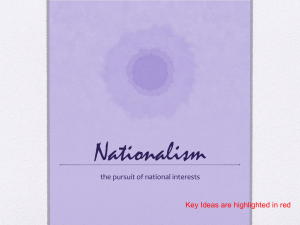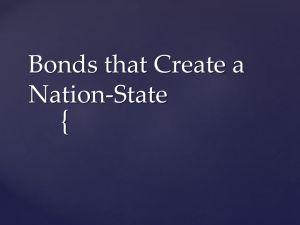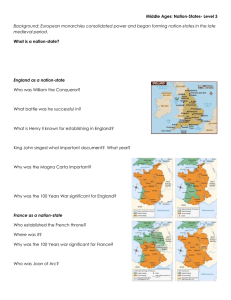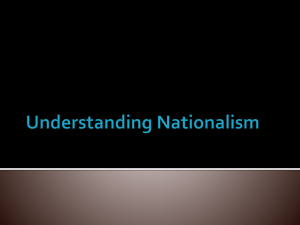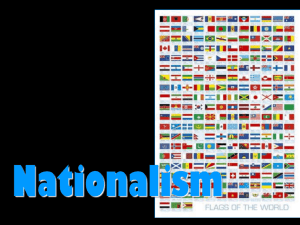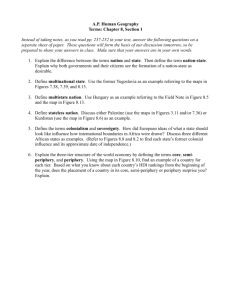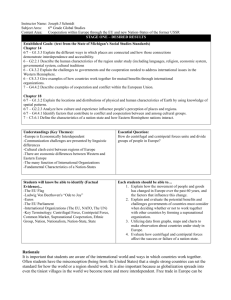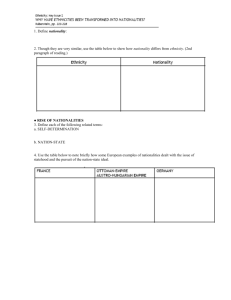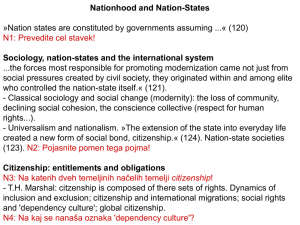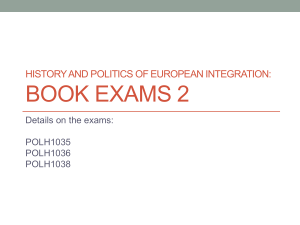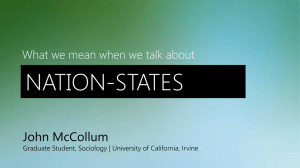HOME READING 1-State, Nation and Nation State
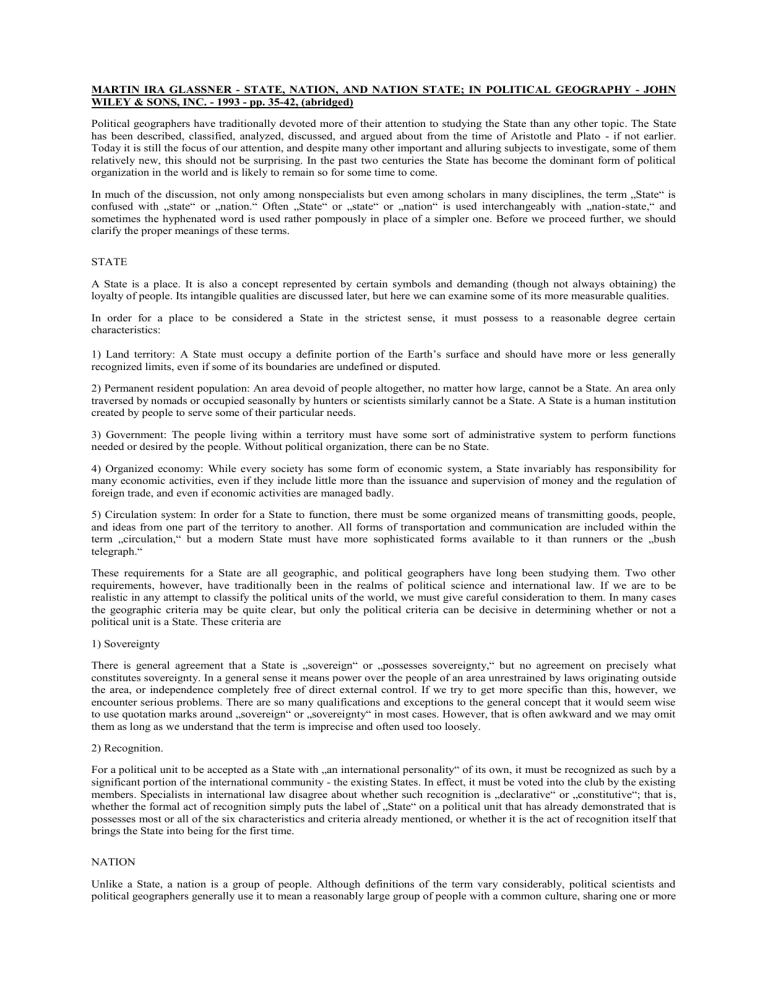
MARTIN IRA GLASSNER - STATE, NATION, AND NATION STATE; IN POLITICAL GEOGRAPHY - JOHN
WILEY & SONS, INC. - 1993 - pp. 35-42, (abridged)
Political geographers have traditionally devoted more of their attention to studying the State than any other topic. The State has been described, classified, analyzed, discussed, and argued about from the time of Aristotle and Plato - if not earlier.
Today it is still the focus of our attention, and despite many other important and alluring subjects to investigate, some of them relatively new, this should not be surprising. In the past two centuries the State has become the dominant form of political organization in the world and is likely to remain so for some time to come.
In much of the discussion, not only among nonspecialists but even among scholars in many disciplines, the term „State“ is confused with „state“ or „nation.“ Often „State“ or „state“ or „nation“ is used interchangeably with „nation-state,“ and sometimes the hyphenated word is used rather pompously in place of a simpler one. Before we proceed further, we should clarify the proper meanings of these terms.
STATE
A State is a place. It is also a concept represented by certain symbols and demanding (though not always obtaining) the loyalty of people. Its intangible qualities are discussed later, but here we can examine some of its more measurable qualities.
In order for a place to be considered a State in the strictest sense, it must possess to a reasonable degree certain characteristics:
1) Land territory: A State must occupy a definite portion of the Earth’s surface and should have more or less generally recognized limits, even if some of its boundaries are undefined or disputed.
2) Permanent resident population: An area devoid of people altogether, no matter how large, cannot be a State. An area only traversed by nomads or occupied seasonally by hunters or scientists similarly cannot be a State. A State is a human institution created by people to serve some of their particular needs.
3) Government: The people living within a territory must have some sort of administrative system to perform functions needed or desired by the people. Without political organization, there can be no State.
4) Organized economy: While every society has some form of economic system, a State invariably has responsibility for many economic activities, even if they include little more than the issuance and supervision of money and the regulation of foreign trade, and even if economic activities are managed badly.
5) Circulation system: In order for a State to function, there must be some organized means of transmitting goods, people, and ideas from one part of the territory to another. All forms of transportation and communication are included within the term „circulation,“ but a modern State must have more sophisticated forms available to it than runners or the „bush telegraph.“
These requirements for a State are all geographic, and political geographers have long been studying them. Two other requirements, however, have traditionally been in the realms of political science and international law. If we are to be realistic in any attempt to classify the political units of the world, we must give careful consideration to them. In many cases the geographic criteria may be quite clear, but only the political criteria can be decisive in determining whether or not a political unit is a State. These criteria are
1) Sovereignty
There is general agreement that a State is „sovereign“ or „possesses sovereignty,“ but no agreement on precisely what constitutes sovereignty. In a general sense it means power over the people of an area unrestrained by laws originating outside the area, or independence completely free of direct external control. If we try to get more specific than this, however, we encounter serious problems. There are so many qualifications and exceptions to the general concept that it would seem wise to use quotation marks around „sovereign“ or „sovereignty“ in most cases. However, that is often awkward and we may omit them as long as we understand that the term is imprecise and often used too loosely.
2) Recognition.
For a political unit to be accepted as a State with „an international personality“ of its own, it must be recognized as such by a significant portion of the international community - the existing States. In effect, it must be voted into the club by the existing members. Specialists in international law disagree about whether such recognition is „declarative“ or „constitutive“; that is, whether the formal act of recognition simply puts the label of „State“ on a political unit that has already demonstrated that is possesses most or all of the six characteristics and criteria already mentioned, or whether it is the act of recognition itself that brings the State into being for the first time.
NATION
Unlike a State, a nation is a group of people. Although definitions of the term vary considerably, political scientists and political geographers generally use it to mean a reasonably large group of people with a common culture, sharing one or more
important culture traits, such as religion, language, political institutions, values, and historical experience. They tend to identify with one another, feel closer to one another than to outsiders, and believe that they belong together. They are clearly distinguishable from others who do not share their culture.
This may seem rather vague, but it may help a bit if we point out that the term „people“ when used as a singular noun is roughly equivalent to „nation“ just as „country“ is roughly equivalent to „State“. Thus, we may properly speak of the Polish nation or the Navajo nation or the Ewe nation because each is a people distinguished from all others by its distinctive culture.
How small a group may be considered a nation? There is no answer to this question. Certainly the group has to be larger than a family, a clan, or even a tribe, but how much larger no one can say. This is one of the dilemmas in the application of the principle of „national self-determination“ or „self-determination of peoples,“ which we discuss later. We have in the world today some very large nations and some very small ones. Compiling a list would be an impossible task. Nevertheless, the concept of the nation as a cultural entity is very old, and it has been very important in the development of the modern political world. Perhaps the critical factor is whether the group in question considers itself to be a nation.
The feeling among a people that they constitute a nation may be carried further, into the political realm. They may begin to feel that they ought to have a State of their own. Or an individual may identify with the State in which he or she resides - or with another State. This linkage with emotion with a political entity called the State is termed, for lack of a better word,
„nationalism.“ Nationalism is an old sentiment, apparently dating from our earliest civilizations, but we are primarily concerned here with its modern manifestations and its effects on the political organization of space.
Nationalism can be a very healthy emotion. It can encourage people to identify with a group larger than their family, clan, or tribe. It can get them interested, even involved, in the affairs of modern society. It can stimulate them to create new ideas and institutions that will advance society as a whole, in partnership with other people and other nations. But if the emotion becomes more powerful it can lead to a demand for self-determination among ever-smaller groups and to the fragmentation of society instead of its unification. Carried further, the emotion can lead to irredentism, the desire to incorporate within the
State all areas that had once been part of it or in which live people who belong to the nation but not to the State. A still more extreme form of nationalism is chauvinism, which may be defined as „superpatriotism,“ excessive and bellicose feelings of superiority over all other peoples and countries. Clearly this is unhealthy; it has frequently led to wars of aggression and to imperialism.
NATION-STATE
Just as the State is the dominant form of political organization today, the nation-state is the ideal form to which most nations and States aspire. That this ideal is very difficult to attain becomes evident when we try to count the number of true nationstates in the world today. Put in the simplest terms, a nation-state is a nation with a State wrapped around it. That is, it is a nation with its own State, a State in which there is no significant group that is not part of the nation. This does not mean simply a minority ethnic group, but a nationalistic group that either wants its own State or wants to be part of another State or wants at least a large measure of autonomy within the State in which it lives.
Despite being composed of a large number of minorities, the United States is arguably a nation-state. Japan certainly is.
Sweden, Uruguay, Egypt, and New Zealand are all nation-states, though they have very different histories and demographic characteristics. The Soviet Union, on the other hand, was an empire, composed of many „nationalities,“ most of which retained much of their cultural heritage in their ancestral homelands. Canada is frequently referred to as „two nations in one
State.“ Belgium, South Africa, Afghanistan, and China are other examples of older countries that are not nation-states, and very few countries that have become independent since World War II can be considered nation-states. As usual, other States fall in the question-mark column; it would take precise definitions, adequate data, and careful analysis to determine whether
Israel, Jordan, Bolivia, or Liberia, for example, can truly be called nation-states.
In recent times we have seen a number of nations that are split among two or more States attempt to break away and form
States of their own. Usually those in one country are more enthusiastic about independence than their compatriots in adjacent countries. In no case yet has the group succeeded in assembling its politically separated parts and creating from them a new nation-state. Some examples are demands for independent States of Macedonians living in Bulgaria, Greece, Yugoslavia, and perhaps Albania; Basques living in Spain and France; and Kurds of Turkey, Iraq, Iran, Syria, and possibly the Caucasus.
The other method of trying to create nation-states from existing States is the secession of areas within a State that are inhabited largely or exclusively by minority ethnic groups. We have seen numerous examples of this in the past few decades alone, and we are likely to see more in the future.
IRREDENTISM
Another manifestation of nationalism, mentioned earlier, is irredentism. The term derives from an area in northern Italy that was still part of Austria in 1871 after the rest of Italy had been unified into a nation-state. Young Italian nationalists referred to it as Italia irredenta, or unredeemed Italy. Today there are a number of irredentist movements around the world, although it is often difficult to distinguish them from relatively routine border disputes, ideological conflicts, or simple aggression. There are also many cases in which people who speak the language or share other cultural attributes with those of a particular State live across the border of a neighboring State but are not involved in irredentist claims. They live in peace as citizens of their
State, and their neighboring States are on good terms.
